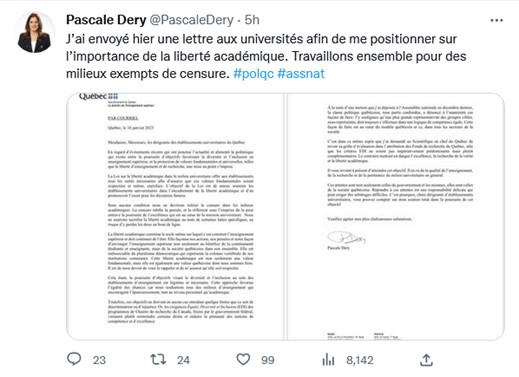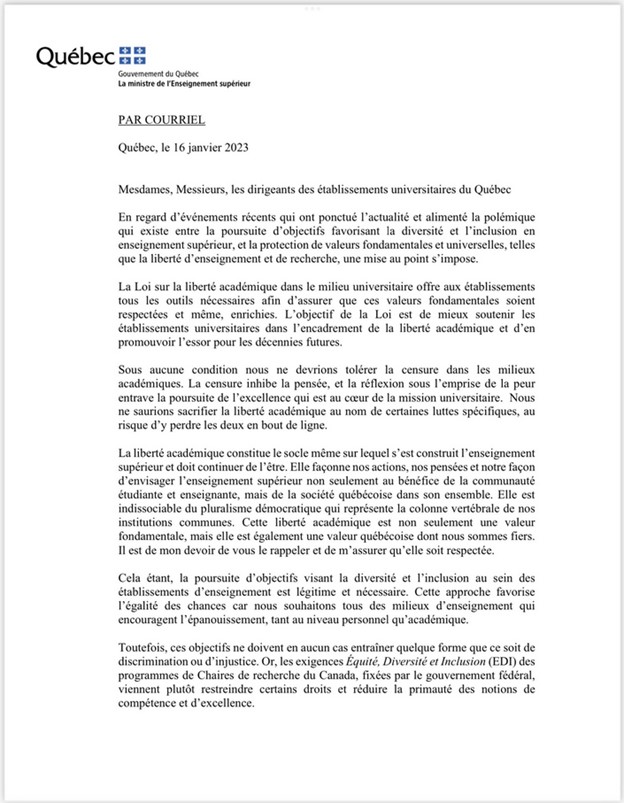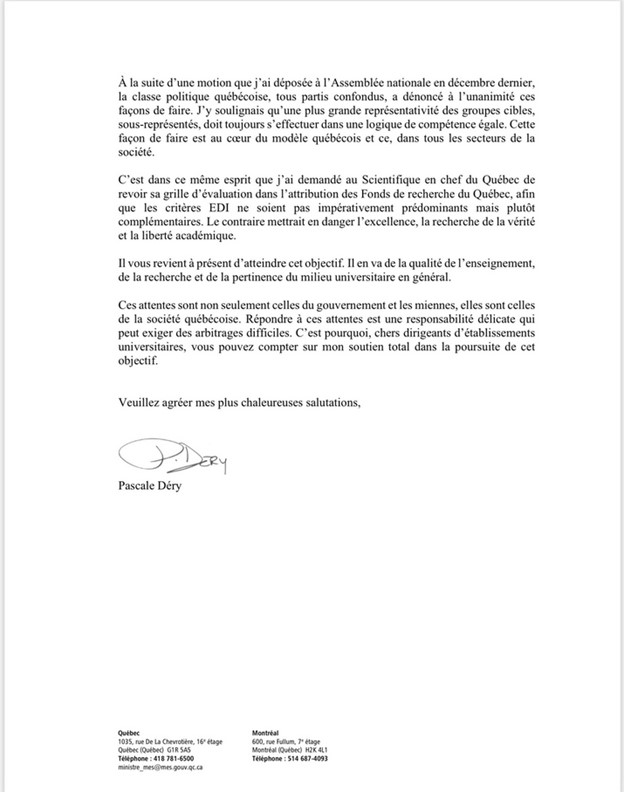
Bravo to Minister Pascale Dery for sending a letter to all the Presidents of Québec universities reminding them of the value of academic freedom, denouncing censorship as well as the discriminatory practices of the so-called EDI (Equity, Diversity, Inclusion) in attributing Canada Research Chairs. Finally, someone standing up against this federally-imposed divisiveness!
Below, you can find her tweet and her letter, all in the official language of Québec. However, Bambi unofficially translated it for you below, with the help of her faithful friend, Mr. Google Translate.
First, Ms. Dery’s tweet, which publicly shared her letter, reads as follows: “I sent a letter to the universities in order to position myself on the importance of academic freedom. Let’s work together for workplaces exempt of censorship“.

Ms. Dery’s beautiful letter to the Presidents of Québec universities (French content) appears following Bambi’s unofficial English translation:
“Québec, January 16, 2023
Ladies and gentlemen, the leaders of the universities of Québec
With regard to recent events that have punctuated the news and fuelled the controversy that exists between the pursuit of objectives favouring diversity and inclusion in higher education and the protection of fundamental and universal values, such as freedom of education and research, a clarification is needed.
Québec’s bill on academic freedom in universities provides institutions with all the necessary tools in order to ensure that these fundamental values are respected and even enriched. The purpose of this bill is to better support academic institutions in the framework of academic freedom and in promoting growth in future decades.
Under no condition should we tolerate censorship in academic institutions. Censorship inhibits thinking and thinking in the grip of fear hinders the pursuit of excellence, which is at the heart of the university’s mission. We cannot sacrifice academic freedom in the name of certain specific struggles, with the risk of losing both at the end of the line.
Academic freedom constitutes the very foundation on which higher education was built and must continue to be so. It shapes our actions, thoughts, and our way of envisioning higher education, not only for the benefit of the student and teaching community, but also for the benefit of the Québec society as a whole. It is inseparable from democratic pluralism, which represents the backbone of our common institutions. This academic freedom is not only a core value, but it is also a Québec value of which we are proud. It is my duty to remind you of this and to ensure that it is respected.
This being so, the pursuit of objectives aimed at diversity and inclusion within educational institutions is legitimate and necessary. This approach promotes equal opportunities because we all want educational environments that promote growth, both personally and academically.
However, under no circumstances should these objectives lead in any way to any form of discrimination or injustice. However, the requirements of Equity, Diversity, and Inclusion (EDI) of programs of Canada Research Chairs, which are set by the federal government, rather restrict certain rights and reduce the primacy of the notions of competence and excellence.
Following a motion that I proposed to the National Assembly last December, Québec’s political class, all parties combined, unanimously denounced these ways of doing things. I underlined that a greater representation of the target groups, underrepresented, must always be carried out in a logic of equal competence. This way of doing things is a the heart of the Québec model, and this in all sectors of society.
It is in this spirit that I have asked the Chief Scientist of Québec to review his evaluation grid in the allocation of research funds by the Fonds de recherche du Québec, so that the EDI criteria are not imperatively predominant, but rather complementary. To do otherwise would endanger excellence, the search of truth and academic freedom.
It is now up to you to achieve this goal. It is about the quality of teaching, research, and the relevance of academia in general.
These expectations are not only those of the government and mine, but they are also those of Québec society. Meeting these expectations is a delicate responsibility that can require difficult trade-offs. This is why, dear leader of university institutions, you can count on my full support in the pursuit of this objective.
Please accept my warmest regards,
Pascale Dery”




I’m not fond of Legault’s government, for being COVID fascists, but on this one, they’re right. And they’re the only ones really pushing back.
What a mess Canada is, generally.
I agree ”What a mess Canada is, generally.” But with Quebec’s history of repression of freedom of speech, freedom of thought and choice of literature going back to the Joseph Guibord fiasco, can this new policy help that much?
Thank you you Fred for your comment. As a historical major reminder, Québec went through a “Quiet Revolution” to say no to the hegemony of the Catholic Church in this province. First, may Mr. Joseph Guibord (1809-1869)’s memory and everyone’s memory, regardless of their stories, in all times be eternal. Who knows? Maybe in our modern times, history will repeat itself and Québec will lead a quiet yet firm and inspiring fight (like an educational revolution) to restore the value of academic freedom; in not just in the universities of the Belle Province, but also hopefully in those across Canada (and the world).
Thank you Bambi. The ”Quiet Revolution” was for Catholics only as everybody else was waiting for them to catch up and are still waiting. As we’ve discussed before, defining documents like ”Le Refus Global” was written in French only despite its ostensible rejection (refusal) of the Catholic Church and traditional values. (Remember, there were no non-Catholics allowed in New France).
What we have in Kebekistan since the 1960s is a consumer society of antinomian sinners who disguise themselves as atheists while clinging to the same values as before but rejecting church attendance. In French, they are called ‘Catho-laïque’ instead. Their attitude is ”don’t forget their Christmas gifts” and ”don’t forget the Easter bunny” bcz they like chocolate, but for everything else that reflects the *best* values, it’s too much effort. Such people have been thoroughly ridiculed on Rock et Belles Oreilles: https://www.youtube.com/watch?v=jGKS9Lvxffg
A big part of the problem with Quebec society is that it misses the authoritarian embrace of the Catholic Church – and replaced it by the state, instead.
Hence the most COVID_fascist government in North America got re-elected in a landslide.
Which doesn’t mean that they’re wrong on the specific issue that we’re discussing, but let’s not lose track of them being no better in general.
Thank you Mike, welcome on this blog, and again thanks Fred. Interesting comment the question of replacement of one authoritarian entity with another. Food for thought, for sure. It is interesting all this question of management of the pandemic and the excesses or mistakes made. One thing is sure, it is hard to govern at all times, and especially during a pandemic. This being said, Bambi finds it interesting how in her birth country, Lebanon, the pandemic management may have actually been the only sphere of the government that succeeded in a remarkable way (Bambi has several posts about it). It was excellent, regardless of who was in charge of the Ministry of Health (two different Ministers/teams); this when the entire country has been sinking at a SCARY speed and with the Beirut explosion tragedy. Sadly, there has been mortality from the alpha (maybe mostly prior to the vaccination campaign) and delta variants of the coronavirus there. However, the vaccination was not forced on people; no one was vilified if not vaccinated (thankfully for them). No one lost a job over it (OK many jobs were already lost due to the crash of the banking system in October 2019 and the following financial crisis). Regardless, people there got vaccinated because they wanted it (health campaigns, informed consent, etc.). Bambi may be wrong, but she thinks that the people of Lebanon would have never accepted the types and levels of measures imposed on Canadians and the Lebanese authorities likely know it well.
Boy, that Mike is one clever fellow. I’d like to sit down over a plate of Japanese food and have a chat with him someday. Maybe Bambi can join us and brew some Vietnamese coffee. I agree with the analysis of the Catholic Church and what flowed from its demise, mostly. Authority to the state, yes. But for the spiritual and values aspect, it was replaced by cults or nothing at all.
Thank you for the invitation. Bambi would love to join you, Fred, and meet you Mike. Yes for the Vietnamese coffee, with milk yummy :)!